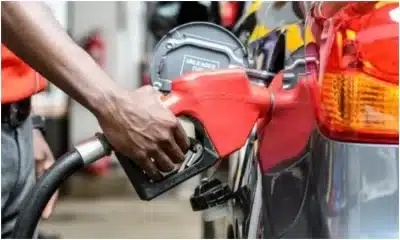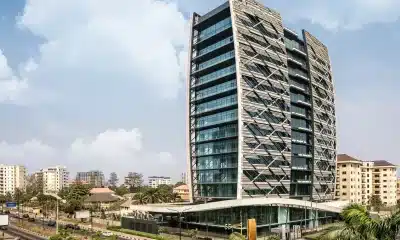Business
Crude Oil Output Decline In Nigeria Continues As NNPCL Combat Theft

The Nigerian National Petroleum Company Limited (NNPCL) is faced with a series of challenges in its effort to return the country to one of the top crude oil-producing nations in the world.
As they are battling crude oil theft in the oil-rich Niger Delta, other factors continue to contribute to the steady decline in crude oil output in the country.
In July this year alone, the NNPCL discovered 162 illegal pipeline connections and illegal refineries in the Niger Delta, mostly in Bayelsa state.
Recently, the federal government-owned oil firm destroyed 93 illegal pipeline connections and 69 illegal refineries uncovered in Aboa and Gbokoda From 15 to 21 July 2023.
A statement from the NNPCL read, “War on crude oil theft: 93 illegal pipeline connections discovered and 69 illegal refineries destroyed in the Niger Delta in the past week”.
The state-owned oil firm confirmed that its maritime intelligence system has detected an ongoing large-scale crude oil theft in the Niger Delta.
An excerpt from NNPCL claimed, “30 wooden boats used in carrying stolen crude oil were confiscated in the past week, with some in Gbokodo, and five cases of oil spill recorded in the deep blue waters.”
In a new claim made last month, NNPCL said as part of its continuous campaign against crude oil theft in the Niger Delta, it has destroyed hundreds of illegal refineries and pipelines.
The company stated via a video shared on X that during the week of August 11, at least 53 illicit refineries and 35 illegal pipeline connections had been found in Rivers, Bayelsa, and Imo.
Eight cases of pipeline vandalism resulted in oil spills throughout the said period and 144 instances in total were noted.
“The war on crude oil theft is on and the industry-wide security collaboration continues to record remarkable progress,” the company said in the video.
“There is no backing down on the war on crude oil theft until the menace is eradicated for good.”
Niger Delta militancy group on the rise
Earlier this year, a self-acclaimed Niger Delta militant group, Creek Reform Warriors, threatened to resume attacks on major oil facilities in the region.
In a statement on the alleged unfair termination of several Forcados Terminal employees, the gang threatened to attack sites managed by Shell Petroleum Development Company of Nigeria Limited, according to Punch.
The head of the organization, “General” Igbokuro Tinowei, demanded the reinstatement of every member of the Ogulagha and Odimodi communities who, in his judgment, had been unlawfully terminated by SPDC in 2019.
He claimed that the IOC continually disregarded its commitment to promptly recall the dismissed workers in the wake of the COVID-19 pandemic.
Tinowei ordered SPDC management to rehire the aforementioned workers as soon as possible to avoid severe consequences, including brutal attacks.
A month after the threats, reports surfaced that a leak at a terminal had forced Shell’s Forcados export grade to go offline, while intelligence about anticipated attacks on SPDC’s oil facilities had been kept secret.
The country lost thousands of barrels when the grade was closed, and the country has not recovered from the setback even after the grade was open.
On the evening of July 12, shipments of the grade, which were scheduled to transport 220,000 barrels per day in July, were halted after workers detected the smell of oil spillage near a single buoy, mooring where crude oil was being loaded into a vessel.
No declaration of force majeure was made, but Shell confirmed that the report had resulted in a decrease in injections into the terminal.
A Reuters report claimed that as a result of the suspension of Forcados loadings, the nation grew to be the second-largest contributor to the fall in OPEC crude oil output in July.
Due to the suspension of Forcados loadings, Nigeria’s crude oil production decreased by 40,000 bpd in July compared to June, making it one of the worst drops in OPEC output.
Crude Oil theft: Government officials also rubbing government
In the Koko region of Delta State in August, the Tanita Security Services intercepted the MT Praisel, a ship transporting crude oil that was allegedly carrying stolen oil, according to Punch.
The 1, 117-ton schooner MT Praisel, which was intercepted, was reportedly being guarded by several naval officials and was transporting about 8,100 barrels of oil.
According to Tanita Security agents, the ship was flying the flag of Togo and was being accompanied by a Navy boat commanded by a senior naval officer.
The naval commander allegedly threatened to punish them harshly after they encountered resistance from the navy boat defending the ship. However, the private security outfit insisted they wouldn’t budge.
According to Tanita operatives, the National Security Adviser, Nuhu Ribadu, and the Chief of Naval Staff, Rear Admiral Emmanuel Ogalla, were eventually called before they were permitted to inspect the ship.
When the security business representatives boarded the ship, they learned that the navy had authorized the vessel to lift crude oil even though the Nigerian Midstream and Downstream Petroleum Regulatory Authority had not.
The incident comes in response to the Federal Government’s outcry that Nigeria had suffered massive economic losses of N2.3 trillion over the preceding 12 months as a result of the unlawful shipments of stolen crude oil.
Note that the owner of the private security company Tanita Security Outfit is Government Ekpemupolo, commonly known as Tompolo, a former Niger Delta insurgent who just won a contract with the Federal Government to guard oil pipelines.
Meanwhile, the NNPCL said Nigeria recently lost a substantial portion of its oil export due to oil theft in the Niger Delta, a development which has affected the country’s OPEC quota negatively.
The NNPCL said 11 vessels were flagged for violations of the Automatic Identification System, and the navy was informed. In July, it intercepted an 800,000-liter ship carrying stolen crude oil while en route to Cameroon.
Aside from the persistent crude oil theft, Felix Obike, the president of the Society of Petroleum Engineers Nigeria Council, cautioned that the fall in crude oil exports would persist until the Federal Government addressed the security of pipelines during a press briefing on the SPE conference in 2023.
Although oil is still being discovered, according to him, many oil companies are no longer shipping their oil for export.
He said, “The oil is there and we are currently exploring but a lot of companies are not transporting their crude oil for exports due to insecurity challenges disturbing the movement of oil”.
Nigeria is looking on the bright side
Despite the nation’s crude oil output declining, the NNPCL declared that the Federal Government would renegotiate the country’s production allotment in the OPEC+ cuts by November.
Mele Kyari, the Group Chief Executive Officer of NNPC, said the country was striving to expand crude oil production by at least 200,000 to 300,000 barrels per day by October in an interview with Bloomberg.
After that, he claimed, the country would push for an increased quota at the OPEC+ gathering that followed in November.
Nigeria produces roughly 1.3 million barrels of crude oil per day, including condensates, according to Kyari.
The current output, according to the NNPCL head, is “far below Nigeria’s capacity.”
He said, “OPEC understands that it is not that Nigeria does not have what it takes to produce more crude, but the challenge has been in terms of security, and everything we are doing to combat insecurity in the Niger Delta is working.
“OPEC has now given us (Nigeria) a target to increase production between now and October, and that figure is going to be worked with. I think it is very practical to get to between 1.5mb/d and 1.6mb/d by October.”
He added, “We have a clear case when during the COVID; we could do close to 2.1mb/d. So, we know we have the capacity. The issues are around the pipeline, and once we can resolve the challenges, then, we can produce higher.”












